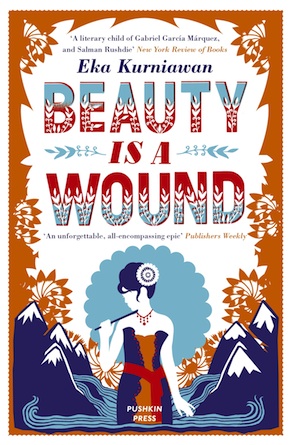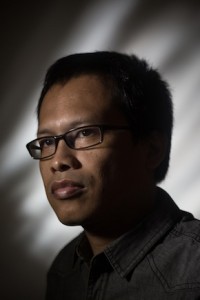Apparitions
by Eka Kurniawan
“A howling masterpiece.” Chigozie Obioma
One afternoon on a weekend in March, Dewi Ayu rose from her grave after being dead for twenty-one years. A shepherd boy, awakened from his nap under a frangipani tree, peed in his shorts and screamed, and his four sheep ran off haphazardly in between stones and wooden grave markers as if a tiger had been thrown into their midst. It all started with a noise coming from an old gravesite with an unmarked tombstone covered in knee-high grass, but everybody knew it was Dewi Ayu’s grave. She had passed away at fifty-two, rose again after being dead for twenty-one years, and from that point forward nobody knew exactly how to calculate her age.
People from the surrounding neighborhood came to the grave when the shepherd boy told them what was happening. Rolling up the edges of their sarongs, carrying children, clutching broomsticks, or stained with mud from the fields, they gathered behind cherry shrubs and jatropha trees and in the nearby banana orchards. No one dared approach, they just listened to the uproar coming from that old grave as if they were gathered around the medicine peddler who hawked his goods at the market every Monday morning. The crowd wholly enjoyed the unnerving spectacle, not caring that such a horror would have terrified them had they been all alone. They were even expecting some kind of miracle and not just a noisy old tomb, because the woman inside that plot of earth had been a prostitute for the Japanese during the war and the kyai always said that people tainted with sin were sure to be punished in the grave. The sound must have been coming from the whip of a tormenting angel, but they grew bored, hoping for some other small marvel.
When it came, it came in the most fantastical form. The grave shook and fractured, and the ground exploded as if blown up from underneath, triggering a small earthquake and a windstorm that sent grass and headstones flying, and behind the dirt raining down like a curtain the figure of an old woman stood looking annoyed and stiff, still wrapped in a shroud as if she’d only just been buried the night before. The people grew hysterical and ran away even more chaotically than the sheep, their synchronous screams echoing against the walls of the faraway hills. A woman tossed her baby into the bushes and its father hushed a banana stalk. Two men plunged into a ditch, others fell unconscious at the side of the road, and still others took off running for fifteen kilometers straight without stopping.
Twenty-one years ago, she had died twelve days after giving birth to a hideous baby girl, so hideous that the midwife assisting her couldn’t be sure whether it really was a baby.”
Witnessing all this, Dewi Ayu only coughed a little and cleared her throat, fascinated to find herself in the middle of a graveyard. She had already untied the two highest knots on her burial shroud, and then set to loosening the two lowest ones to free her feet so she could walk. Her hair had grown magically so that when she shook it loose from the calico wrap it fluttered in the afternoon breeze, sweeping the ground, and shimmering like black lichen in a riverbed. Her skin was wrinkled, but her face was gleaming white, and her eyes came alive inside their sockets to stare at onlookers abandoning their hiding places behind the shrubs – half of them ran away and the other half fainted. She complained, to no one in particular, that people were evil to have buried her alive.
The first thing she thought of was her baby, who of course was no longer a baby. Twenty-one years ago, she had died twelve days after giving birth to a hideous baby girl, so hideous that the midwife assisting her couldn’t be sure whether it really was a baby and thought that maybe it was a pile of shit, since the holes where a baby comes out and where shit comes out are only two centimeters apart. But this baby squirmed, and smiled, and finally the midwife believed that it really was a human being and not shit, and said to the mother, who was lying weakly across her bed with no apparent desire to see her offspring, that the baby was born, was healthy, and seemed friendly.
“It’s a girl, right?” asked Dewi Ayu.
“Yes,” said the midwife, “just like the three babies before her.”
“Four daughters, all of them beautiful,” said Dewi Ayu in a tone of complete annoyance. “I should open my own whorehouse. Tell me, how pretty is this one?”
The baby wrapped up tight in a swaddling cloth began to squirm and cry in the midwife’s arms. A woman was coming in and out of the room, taking away the dirty cloths full of blood, getting rid of the placenta, and for a moment the midwife did not answer because there was no way she was going to say that a baby who looked like a pile of black shit was pretty. Trying to ignore the question she said, “You’re already an old woman, so I don’t think you’ll be able to nurse.”
“That’s true. I’ve been used up by the three previous kids.”
“And hundreds of men.”
“One hundred and seventy-two men. The oldest one was ninety years old, the youngest one was twelve, one week after his circumcision. I remember them all well.”
The baby’s entire body was jet black as if it had been burned alive, her nose looked more like an electrical outlet, her mouth a piggy-bank slot and her ears pot handles.”
The baby cried again. The midwife said that she had to find breast milk for the little one. If there was none, she’d have to look for cow’s milk, or dog’s milk, or maybe even rat’s milk. Yeah, go, said Dewi Ayu. “Poor unfortunate little girl,” said the midwife, gazing at the baby’s upsetting face. She wasn’t even able to describe it, but she thought it looked like a cursed monster from hell. The baby’s entire body was jet black as if it had been burned alive, with a bizarre and unrecognizable form. For example, she wasn’t sure whether the baby’s nose was a nose, because it looked more like an electrical outlet than any nose she’d ever seen in her entire life. And the baby’s mouth reminded her of a piggy-bank slot and her ears looked like pot handles. She was sure that there was no creature on earth more hideous than this wretched little one, and if she were God, she would probably kill the baby at once rather than let her live; the world would abuse her without mercy.
“Poor baby,” said the midwife again, before going to look for someone to nurse her.
“Yeah, poor baby,” said Dewi Ayu, tossing and turning in her bed. “I already did everything I could to try to kill you. I should have swallowed a grenade and detonated it inside my stomach. Oh wretched little one – just like evildoers, the wretched don’t die easy.”
At first the midwife tried to hide the baby’s face from the neighbor women who arrived. But when she said that she needed milk for the baby, they pushed against each other to see it, since it was always fun for those who knew Dewi Ayu to see her adorable little girl babies. The midwife was unable to stave off the onslaught of people pushing aside the cloth hiding the baby’s face, but once they’d seen it, and screamed from a horror unlike any they had ever experienced before, the midwife smiled and reminded them that she had tried her best not to show them the hellish countenance.
After that outburst, as the midwife left in a hurry, they just stood for a moment, with the faces of idiots whose memories had been suddenly erased.
“It should just be killed,” said a woman, the first one freed from her sudden-onset amnesia.
“I already tried,” said Dewi Ayu as she appeared, wearing only a rumpled housedress and a cloth tied around her waist. Her hair was a total mess, like someone staggering away from a bullfight. People looked at her with pity.
“She’s pretty, right?” asked Dewi Ayu.
“Um, yes.”
“There’s no curse more terrible than to give birth to a pretty female in a world of men as nasty as dogs in heat.”
Not one person responded, they just kept looking at her with sympathy, knowing they were lying. Rosinah, the mute mountain girl who had been serving Dewi Ayu for years, led the woman into the bathroom, where she had prepared hot water in the tub. There Dewi Ayu soaked with fragrant sulfurous soap, attended by the mute girl who shampooed her hair with aloe vera oil. Only the mute seemed unfazed by any of this, even though she surely already knew about the hideous little girl, since no one else but Rosinah had accompanied the midwife while she worked. She rubbed her mistress’s back with a pumice stone, wrapped her in a towel, and straightened up the bathroom as Dewi Ayu stepped out.
Someone tried to lighten the gloomy mood and said to Dewi Ayu, “You need to give her a good name.”
“Yeah,” said Dewi Ayu. “Her name is Beauty.”
“Oh!” the people exclaimed, embarrassingly trying to dissuade her.
“Or how about Injury?”
“Or Wound?”
“For God’s sake, don’t name it that.”
“Okay then, her name is Beauty.”
They watched helplessly as Dewi Ayu walked back into her room to get dressed. They could only look at one another, sadly imagining a young girl black as soot with an electrical outlet in the middle of her face being called by the name of Beauty. It was a shameful scandal.
Extracted from Beauty is a Wound, translated by Annie Tucker.
 Eka Kurniawan was born in Tasikmalaya, Indonesia, in 1975. He studied philosophy at Gadjah Mada University, Yogyakarta, and has published five short story collections and four novels including Man Tiger, which was longlisted for the 2016 Man Booker International Prize. Beauty is a Wound, his 2002 debut novel, is now published in the UK by Pushkin Press. Read more.
Eka Kurniawan was born in Tasikmalaya, Indonesia, in 1975. He studied philosophy at Gadjah Mada University, Yogyakarta, and has published five short story collections and four novels including Man Tiger, which was longlisted for the 2016 Man Booker International Prize. Beauty is a Wound, his 2002 debut novel, is now published in the UK by Pushkin Press. Read more.
Author portrait © Nina Subin
Annie Tucker is a writer and translator based in Los Angeles. She has a PhD from UCLA and is the recipient of a PEN/Heim Translation Fund award.

